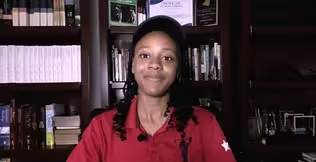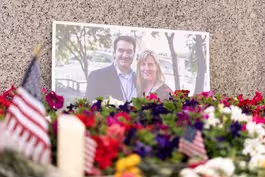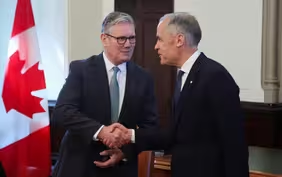
‘Panic industry’ booms as more Americans fortify their homes
Clip: 6/15/2025 | 5m 25sVideo has Closed Captions
‘Panic industry’ surges as more Americans fortify their homes to prepare for the worst
Bomb shelters, secret passageways, gun rooms and flammable moats may sound like the stuff of Hollywood. But today across the country, they’re part of plans people are making to protect themselves against the worst. That’s according to a recent report in The New York Times Magazine. Ali Rogin speaks with the publication’s contributing photo editor Coralie Kraft for more.
Problems playing video? | Closed Captioning Feedback
Problems playing video? | Closed Captioning Feedback
Major corporate funding for the PBS News Hour is provided by BDO, BNSF, Consumer Cellular, American Cruise Lines, and Raymond James. Funding for the PBS NewsHour Weekend is provided by...

‘Panic industry’ booms as more Americans fortify their homes
Clip: 6/15/2025 | 5m 25sVideo has Closed Captions
Bomb shelters, secret passageways, gun rooms and flammable moats may sound like the stuff of Hollywood. But today across the country, they’re part of plans people are making to protect themselves against the worst. That’s according to a recent report in The New York Times Magazine. Ali Rogin speaks with the publication’s contributing photo editor Coralie Kraft for more.
Problems playing video? | Closed Captioning Feedback
How to Watch PBS News Hour
PBS News Hour is available to stream on pbs.org and the free PBS App, available on iPhone, Apple TV, Android TV, Android smartphones, Amazon Fire TV, Amazon Fire Tablet, Roku, Samsung Smart TV, and Vizio.
Providing Support for PBS.org
Learn Moreabout PBS online sponsorshipJOHN YANG: Bomb shelters, secret passageways, gun rooms and flammable moats may sound like the stuff of Hollywood.
But across the country, there are parts of some people's plans to protect themselves against the worst.
That's according to a recent New York Times Magazine report that chronicles the rise of the booming panic industry.
Eli Rogin spoke with Coralie Kraft, contributing photo editor for the New York Times Magazine.
ALI ROGIN: Coralie, thank you so much for joining us.
What's behind the rise in people wanting to prep for some sort of doomsday scenario?
CORALIE KRAFT, Writer and Photo Editor, The New York Times: So the people that I spoke with said that there was a huge surge in business post-pandemic and also in the lead up and aftermath of the recent election.
I would say that many of the people who are interested installing these types of hidden gun ranges and panic rooms and things like that in their homes, many of them said that they were afraid of things like another pandemic, financial collapse or, you know, even nuclear war.
ALI ROGIN: And the notion of prepping has been a fascination on the pop culture scene for a number of years now.
How do you describe this kind of mainstreaming of the panic industry and of preparing in this way?
CORALIE KRAFT: I think that as more and more people are impacted by things like pandemics, by civil unrest and, you know, demonstrations and activism in their cities, by financial collapse as those factors hit a wider and wider population, it makes sense to me that more of us would be interested in this type of, you know, what can I do in the event of a disaster scenario or a doomsday scenario.
ALI ROGIN: People in the middle class you report on are becoming more interested in this.
These companies are getting more calls from people who don't have millions of dollars, but they do want to invest in some ways, as they see it, to protect themselves.
CAROLIE KRAFT: That's completely right.
Yeah.
So, you know, there are bunkers that are prefab and might cost someone $20,000 instead of 100,000 or 10 million.
One of the people that I spoke with said something like, the bunkers that I'm selling are for people who have $20,000 to spend, not $200,000.
They make $60,000 and drive a Chevy pickup truck.
They don't drive a Ferrari.
They don't drive, you know, fancy cars and things like that.
ALI ROGIN: What do we know about any correlation between the amount of money you have to spend one of these things and your chances at actually surviving some sort of cataclysmic event?
CAROLIE KRAFT: After speaking with several people who are in this industry, I think that there are certainly some clients who are thinking very actively about exactly how they will survive.
You know, the event, they call it the doomsday event.
I think that also a lot of them are living in the anxiety of the now rather than the reality of the future, if that makes sense.
ALI ROGIN: It does.
That's really interesting, but you've seen some very extravagant lengths that people are going to.
I know you are limited in what you can disclose about some of them, but describe what you saw on the higher end of this industry.
CORALIE KRAFT: There's a location that I cannot reveal, but it is in the upper Midwestern United States where an individual and his family have decided to build a compound for themselves that is a fortified home surrounded by a moat.
And that moat can be lit on fire at will by the homeowner.
There are cannons on the property that will distribute a flammable liquid across the surface of the moat.
There is also a tunnel leading to the property that essentially functions as a giant microwave.
And it could heat up and, in theory, stop any unwanted intruders.
ALI ROGIN: Are there any ideological similarities that you picked up among the people investing in these measures that would indicate, you know, a similar school of thought on the animating issues that they're talking about, like climate change, like the economy, like civil unrest.
CORALIE KRAFT: I would say that the commonality is that they're all driven by a very strong need for peace of mind.
There are certainly people who did say that climate change is a concern, but when it comes to thinking about climate change, it's not necessarily that they are someone who believes in climate change as a holistic concept.
It's more that they have noticed that there are more tornadoes in their areas or more extreme weather.
And, you know, I think that financial collapse, certainly, especially for some of the wealthier clients, that is something that is very top of mind for them.
And the pandemic, as I said, really impacted people of all income levels.
The commonality of that experience is something that is broadening the market, I would say, and kind of leading at least in part to a surge in business within this industry.
ALI ROGIN: Coralie Kraft with the New York Times.
What a fascinating story.
Thank you so much.
CORALIE KRAFT: Thank you so much for having me.
How teenage rising golf star Genesis Lewis got into the game
Video has Closed Captions
Clip: 6/15/2025 | 4m 23s | How teenage rising golf star Genesis Lewis got into the game (4m 23s)
Israel and Iran launch deadly strikes for third straight day
Video has Closed Captions
Clip: 6/15/2025 | 5m 2s | Israel and Iran launch new round of strikes as deadly conflict rages into third day (5m 2s)
Klobuchar reflects on legacy of slain Minnesota lawmaker
Video has Closed Captions
Clip: 6/15/2025 | 5m 54s | Minnesota Sen. Klobuchar reflects on legacy of slain state lawmaker (5m 54s)
News Wrap: World leaders arrive in Canada for G7 summit
Video has Closed Captions
Clip: 6/15/2025 | 2m 48s | News Wrap: World leaders arrive in Canada for G7 summit (2m 48s)
Providing Support for PBS.org
Learn Moreabout PBS online sponsorshipSupport for PBS provided by:
Major corporate funding for the PBS News Hour is provided by BDO, BNSF, Consumer Cellular, American Cruise Lines, and Raymond James. Funding for the PBS NewsHour Weekend is provided by...















